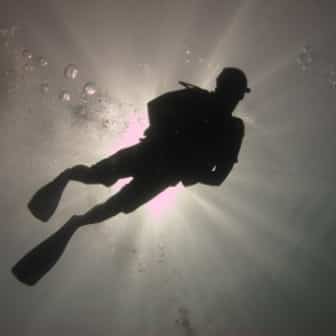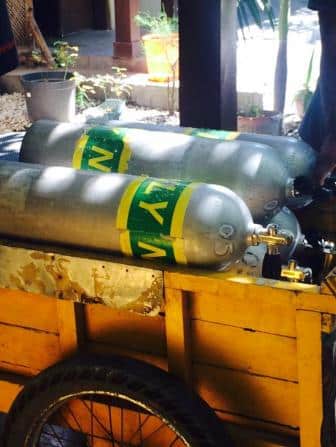PADI Specialty Diver courses are an good way of safely discovering specific diving environments that may require a little more skills and knowledge than those gained in the Open Water or Advanced Open Water Diver courses. The Specialty Diver courses are an excellent choice for people who are really enjoying certain diving environments and wishing to learn how to explore them safely, getting the most fun from them.
We offer a wide range of PADI Specialty courses. Have a look through the specialties below and see if any triggers your interest.

Ever wondered why there are always other divers using a different tank to yours? They are probably using enriched air nitrox. There are several benefits to using enriched air over normal compressed air. Nitrox allows divers to stay down longer and return to the water quicker, making it particularly useful on deep dives. The PADI Enriched Air course is one of our most popular specialties.

Specialist training and knowledge of air at depths is needed to investigate deeper dive sites. The Deep Diver Specialty is designed to learn you how to plan and organize deep dives, which procedures and techniques to use, how to manage problems and hazards but most importantly it will learn you how to enjoy life at 18-40 meters down.
You want to learn how to capture you underwater memories on camera? Digital Underwater Photography is one of the most popular PADI Specialties. The course is suited for beginner photographers, using snap-and-shoot cameras, as well as for divers with more sophisticated equipment. We’ll teach you all about the different techniques involved in taking photos underwater.
The underwater realm has a whole different set of residents active at night time. Torches bring out colors in the coral that can’t be seen during the day, while nocturnal creatures come out to play. It really is a completely different world down there at night.
Night diving requires different skills compared to diving in the day, including different signals and learning how to deal with orientation.
Buoyancy control can be very difficult to master, but staying neutrally buoyant is useful for conserving air and it is important to avoid damaging the underwater environment. The PADI Peak Performance Buoyancy (PPB) course starts from the basic skills learnt in the Open Water course, giving you more knowledge and skills to refine your buoyancy control.
From trimming down your gear to hovering almost motionless in the water will be practiced during the course.
There are no road signs underwater and we all got lost once while diving, didn’t we? That is why underwater navigation is a compulsory adventure dive on the advanced course and it is also a popular specialty course. Underwater Navigator is an excellent specialty to have if you know you’ll be diving in conditions with limited visibility or in conditions where you’ll be diving without obvious landmarks.
For wreck diving you need specific skills and knowledge, to ensure you get the most enjoyment from the dives and to ensure you stay safe. The wreck diver specialty course teaches you how to carefully traverse and penetrate a wreck in a safe way. We have a beautiful wreck just around Gili Trawangan.
When something gets lost underwater, there are different techniques to find it again. The Search and Recovery specialty teaches you how to search for an item underwater and how to return it to the surface. You will learn search patterns, the use of lift bags and other skills needed to recover lost items.
Ever wondered why certain fish are one color while others are different? This specialty teaches you some of the ins-and-outs of the complicated world of marine biology and animal behavior. You’ll learn how to identify fish, crustaceans, mollusks and others on this course
Can you tell a banner fish from an angelfish? What’s the difference between a cuttlefish and a squid? The PADI Project Aware Fish Identification specialty will teach you how to identify the different fish and other water creatures.
This course is for divers and for non-divers! It is a workshop designed to teach you about how coral reefs work and why they are so important for the health of our oceans. YOU can help to preserve the coral reefs.
There are many dive sites around the world with very strong currents. If you are planning to dive in such conditions, the drift diver specialty can be very useful. The specialty teaches you how to safely use ocean currents so you can enjoy diving in these strong environments. You learn how to safely plan and carry out drift dives, exit techniques and you will learn about the hazards. We will talk about how to use the specialist equipment for drift diving and how to stay close to your buddy or group.
The fun doesn’t need to stop here! With more training from professionals, you can go even further and become a PADI dive professional. Imagine sharing your love of diving with others!
Check out the Divemaster program in which you can be involved.
It’s your chance to move to the next level in your diving adventures!
